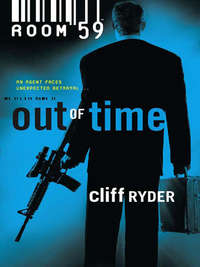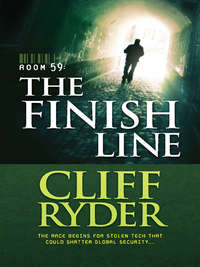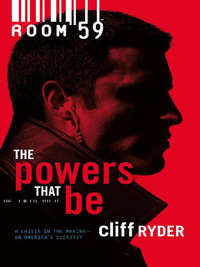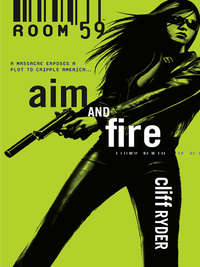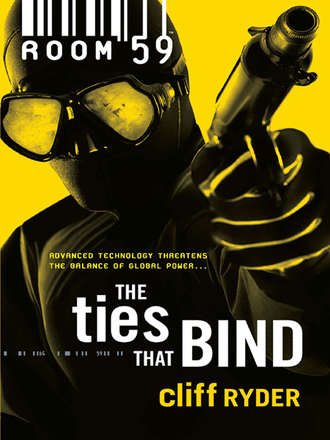
Полная версия
The Ties That Bind
“It always does,” Denny said. “And if we don’t change with it, we won’t be anything more than dinosaurs waiting for a meteor strike.”
“I’m not ready to be a fossil quite yet,” Kate said, laughing.
“Nor am I,” Denny said, “despite how I look. I’ll keep you in the loop.”
“Do that,” Kate said. Then she added, “And you look fine.” She cut the connection, her virtual avatar winking out of existence.
Denny leaned back, then returned to the file folders on his desk. He’d already spoken to Tina Kanut and explained the situation. She was to play the native guide and nothing else. Her only job was to keep an eye on Jason and if things began to go wrong, she could step in, identify herself and lend a hand.
Sadly, there was more going on in Room 59 than this one mission, and his attention was needed elsewhere. Win or lose, succeed or fail, there were always threats to be addressed. The threats, Denny thought, never stop. He hoped he was doing the right thing where Siku was concerned, but his agents needed to be human, as much as they needed to be effective. Too much of what Room 59 did involved making human decisions. It wasn’t all about killing. Sometimes, it was about choosing the lives of others over your own.
And sometimes, it was just the opposite.
3
The flights from Minneapolis to Seattle and on to Anchorage were uneventful, and Jason spent his time mentally reviewing the specifics of the mission, memorizing his cover story and trying to determine the best way to address the challenges of trying to find a submarine in the icy waters of the Bering Strait. Of course, finding it wasn’t the only problem, though that one was a significant challenge in and of itself.
But the biggest problem would be getting to the sub, getting on board and getting out again without being seen or captured. Even the largest submarines in the world had very limited amounts of space, and the entire crew would know one another on sight. The likelihood of capture or death was quite a bit higher than usual, and being sent on what could be either a wild-goose chase or a death sentence didn’t improve his mood very much. Denny had to have known this was not a simple mission, possibly even a suicide mission, and Jason intended to have some serious words with him when he returned—assuming, of course, that he survived at all.
As the plane began its descent into Anchorage, Jason thought about the fact that this wasn’t going to be his usual kind of operation. He enjoyed missions where planning was almost as important as execution. The proper plans almost always led to the successful completion of an op, and in his experience, failure was usually the result of poor planning. The problem here was that no plan could possibly address all—or even most—of the likely challenges. In other words, he was going to have to wing it. It was an uncomfortable sensation for him at best.
Still, he suspected that these kinds of missions were among the reasons that Room 59 existed in the first place. During his training period, his final test—what they called a mission assessment—was the elimination of a well-protected foreign dignitary who’d been selling state secrets on the black market. It had been an unfortunate situation all the way around. The man had a history of excellent public service to his own country and had built a network of friends within the U.S. government, as well. But he also had a gambling problem that led to a massive debt load. He turned to the only resource he had—selling secrets to both sides and funneling the profits to pay off his debts. Still, the man had a wife, two kids, a family…and he had to die. It wasn’t a situation where a slap on the wrist would do the job. His removal had to be quick and quiet.
After reviewing the mission parameters, Jason had flown to Washington, D.C., and attended a party where the man was a guest. He’d slipped through the crowd in a waiter’s uniform and removed him with a poisoned appetizer. By all appearances, the man had had a massive heart attack and was dead long before the paramedics could arrive. It was an unfortunate end to what had been a successful career, and his family would suffer grief. Still, Jason didn’t ask any questions and he didn’t hesitate. His trainers were very pleased, and even Denny had congratulated him on doing a difficult mission without letting it get personal.
“Why would it have gotten personal?” Jason had asked.
“Targets are still people,” Denny had said. “The man had a family and was well respected.”
“It wasn’t personal to me,” Jason had said. “He needed to be killed. That simple.”
Denny had stared at him for a long moment, then nodded. “You’ll find, I think, that many of our missions aren’t so simple, as you put it. Sooner or later, you’ll run into something that makes it personal.”
Jason smiled grimly. “Nothing in our line of work, not even death, is personal. What we do is simple because it’s necessary. There’s no need to muck things up with feelings.”
For some reason, remembering that briefing now, Jason thought that perhaps Denny had been right. Sometimes the work could get personal. Even being this close to where his family had come from, where they might still be, made him edgy. He turned his mind back to his work.
Other than his cover story as part of a geological-survey team, Jason didn’t see a need to be overly creative with this mission. His real name would work fine and might even be helpful with some of the native people. After the plane touched down, Jason grabbed his laptop case from beneath the seat in front of him and made his way through the terminal to claim his baggage.
Denny had arranged a guide who was familiar with the coastline and knew the native population well. Jason grabbed his bags from the carousel and took a cab to his hotel. He’d chosen the Anchorage Grand Hotel for its central downtown location since he wasn’t sure how his guide would suggest they travel up to the strait.
He arrived at the hotel, and was pleased to find a message waiting for him from the local guide. His briefing materials indicated that she worked with a travel agency and came highly recommended. Jason checked in and used his cell phone to call her. He suggested they meet for dinner to discuss his needs and her ideas. She sounded bright and ready to work, and if nothing else, having someone along who knew the area well would be a good thing.
He took a brief nap, then headed down to the dining room to wait for Tina Kanut. When she stepped into the restaurant, Jason did a quick double take. For some reason, he’d expected her to look more like the native guides he’d used for missions in the Middle East or in Africa—weathered, worn and hardened by the conditions of their lifestyle.
In person, Tina looked younger than her picture, probably in her late twenties or early thirties, with the dark hair and eyes of her native Inuit people. She was breathtakingly beautiful. The photo Denny had shown him didn’t do her justice. She moved with the kind of grace usually reserved for dancers, and her frame was tall and lean. He caught her eye and waved her over. She waved back and headed his way.
Jason knew that a woman like this could be a distraction on a mission—he was a man, after all—but if she proved competent, then it would be up to him to control his urges and stay focused. It wouldn’t be fair to deny her the job simply because she happened to be knockout gorgeous.
He stood as she reached the table and offered his hand. “Jason Siku,” he said, keeping his handshake firm and businesslike. “It’s nice to meet you.”
“Hi, Mr. Siku,” she said. “Tina Kanut. It’s nice to meet you, too.”
A sexy voice, too, Jason thought, then forced himself to business. “Please, sit down.” He resisted the urge to pull out her chair.
They both sat, and he signaled the waitress, who came over and took their drink orders. Scotch on the rocks for him, and a soft drink for her. They made meaningless small talk until the drinks arrived, then turned to business.
“So,” Tina said. “The agency told me that you were looking for a native guide, all the way up to the Bering Strait. That’s a long haul from here.”
He nodded. “Yes,” he said. “My thought is to fly to Nome, then head up along the coast.”
She considered this for a moment, then said, “That makes the most sense, but it’s not an easy trek, Mr. Siku. There are only a few roads leading out of Nome, and even those only go a short distance. After that, it’s ATVs and hard work.”
“I can handle it,” he said. “I’ve traveled all over the world in some of the roughest country this planet has to offer.”
Tina laughed quietly. “I’ve heard that before, too,” she said, then changed tack. “What are you looking for specifically?” she asked. “I might be able to save you a lot of time if I know what you’re after.”
“Nothing in particular,” he said. “The company I work for does detailed, computer-based mapping, combining physical inspections, satellite imagery and aerial photography. They send me out in advance of the regular team so I can get the lay of the land, let them know of any problems the ground team might encounter before they arrive.”
“You don’t work for an oil company, do you?” Her tone was one of pure suspicion.
“An oil company?” Jason asked, honestly perplexed. “No. Pretty much I’m a what-you-see-is-what-you-get kind of guy. Why would you think I work for an oil company?”
“No reason,” she said, her voice filled with doubts.
“Look, Tina,” he said. “I need a guide and you’re who my company arranged for. The agency says you’re the best. I’m not sure where all your suspicions are coming from, but I can assure you that I only want to tour the region and head back home.”
“My suspicions are pretty well founded,” she said. “You wouldn’t be the first native or half native who’s come up here, working for one of the oil companies and looking to exploit my people.”
Jason chuckled in sudden understanding. “Well, you’re right about part of that, anyway,” he said. “Yes, I’m half-Inuit. But I grew up in an orphanage and I don’t know much at all about my biological parents, where they live or anything else. To be honest, I don’t really care. I’m just here to do a job and go home.” He let his tone turn more serious. “I don’t have any interest in doing anything other than my scout survey job, and then I’m gone.”
“Siku is a common enough name, but there is something vaguely familiar about you,” she said. “I just…” She sighed deeply, then straightened. “Never mind. And please excuse me. I’m sorry, Mr. Siku. I don’t mean to come across so defensive. There are a lot of unscrupulous people in the world and a few of them have turned their eyes to this part of the world, hoping to cash in on the natives. I don’t take jobs that will put them in danger or leave them exposed to more problems than they already have.”
“Call me Jason,” he said. “And don’t worry about it. I’d rather you be up-front about any concerns you might have now than have to get a new guide along the way. Good ones are hard to replace and the agency said they were sending me the best. I’m not here to search out my family or take advantage of your people in any way.”
She nodded, and then said, “They are your people, too, even if you don’t know them.”
Her words struck a chord with his own thoughts of the previous weeks, but he knew that family would only be another distraction during a difficult assignment. “Maybe,” he said, “but I’m afraid that I’ve never really seen it that way. And while this trip might present an opportunity to search out my family, I am here for business.”
“Fair enough,” she said. “I’ll be your guide. When do you want to leave?”
It was Jason’s turn to smile. “Not so fast,” he said. “Now it’s my turn to ask some questions of you.”
“Of course,” she said. “What do you want to know?”
“How long have you been a guide?” he asked.
“I started doing wilderness guide work with my grandfather when I was sixteen,” she said. “So…almost twenty years now. Usually, I work with groups wanting to see native villages or the national parks and wildlife, but I’ve done other types of tours, too.”
Jason nodded. “Such as?”
“A lot of corporate folks think that they can make a lot of money if they find the right angle,” she said. “For a while, they were willing to pay me really well to tour them around and prove how wrong they were.” She laughed. “I stopped when I realized that they were never going to go away. The hunger for land and cheap, exploitable labor never ends. That’s why there’s so many mining operations up here—but at least they tend to pay well, even if the work is backbreaking and dangerous.”
“Fair enough,” he said. “What kind of challenges can we expect on our journey?”
“That depends,” she replied. “You’ve picked a good time to come up here. In early fall, the temperatures are decent and the wildlife hasn’t gotten really hungry yet. We’ll stay in the villages whenever we can. Aside from panic, do you know what kills most people wandering around in the wilderness?”
He shook his head.
“Lack of awareness,” she continued. “People don’t pay attention to what’s going on around them—the way the ice might be cracked or weak in certain areas, signs of dangerous animals, that kind of thing. Up here, it pays to be observant.”
“You might be surprised how many parts of the world that rule applies to,” he said. “Still, I’ll make a point of remembering.” He laughed. “Of course, I make a living by being observant, so perhaps we’ll do just fine.”
“I haven’t lost anyone yet,” she said. “Is there anything else you’d like to know?”
Signaling the waitress, Jason said, “Just two things. What do you want for dinner and when do we leave?”
“We can catch a flight to Nome tomorrow,” she said. “Alaska Airlines has several flights a day.”
“And dinner?” he asked.
She smiled and once again he was struck by her attractive appearance, which didn’t seem to match her job. “I’m going to have dinner with some friends tonight, Jason. Then I’m going to get some rest. I’ll pick you up tomorrow morning and we’ll go to the airport.”
“You’re not going to let me buy you dinner?” he asked, disappointed. The company of a beautiful woman made almost every mission more bearable. No strings, just temporary pleasure.
“No,” she said. “I wouldn’t want you to think it was my tip. Usually those come after the work.”
“I was just being friendly,” he protested. “Nothing wrong with having a bite of dinner together, is there?”
“Actually,” she said, “there is. I don’t socialize with my clients. I don’t get personal with my clients. I take them where they want to go, show them what they want to see, keep them safe and send them on their way.” She finished off the last of her soda, then added, “Just business, okay? I’ll see you in the morning. Eight o’clock sharp.” Tina nodded to him, then turned and walked out of the restaurant.
While admitting to himself that she looked just as good leaving as she had coming in, Jason found himself a bit flabbergasted. He hadn’t made a pass or suggested they go upstairs for a slow tango between the sheets. But it was rare that he got the rough brush-off just like that.
“I just asked what she wanted to eat,” he muttered to himself.
“I’m sorry, sir?” the waitress asked.
He looked up, realized that she’d been standing there waiting.
“Nothing,” he said. “Never mind.”
“The lady won’t be staying for dinner?”
“Apparently not,” he said. He glanced at the menu again, then said, “I’ll have the burger, please.”
“Struck out, huh?” the waitress asked, a grin forming on her features. “Don’t worry. It happens to the best of them.”
“Not to me,” he muttered again, then forestalled her asking what he’d said by adding, “I’d also like a salad, but after the main course.”
“Yes, sir,” she said. “Can I get you anything else?”
“No, thank you,” he replied.
“Save room for dessert,” she suggested. “Our espresso torte is heavenly.”
“I’ll keep it in mind,” he said. The waitress walked away and Jason turned his thoughts inward once more.
He had a guide, but she was also more than a little uptight. And automatically suspicious. He’d have to be careful to keep her focused on what she believed he was here for. That she was protective of her people was understandable, but the woman herself seemed contradictory. One second she was nice, straightforward and engaged. The next, she was practically telling him off for asking her what she wanted to eat. There was something about her that struck him as familiar, too, but he couldn’t place what it was.
Still, so long as he moved carefully, she would be easy to keep distracted. At least until he disappeared while looking for the sub. He would have to try to think of something to keep her from sending out search parties for him.
He sighed. Another complication—and a female one at that—was not what this mission needed. Resigned to making the best of it, he settled in to wait for his meal.
4
The road out of Nome was little better than a rutted concrete path, but Tina quickly proved herself competent. Using a large SUV and a trailer with two ATVs, she guided their vehicle around the worst of the potholes and hazards, while simultaneously pointing out sites of interest along the way. She was a good guide, Jason realized, knowledgeable about the area, its history, people and animals. She didn’t talk too much, but kept the conversation light and interesting. And completely impersonal.
The landscape itself was one of harsh beauty. Dark-brown-and-green tundra grasses dominated the view, with distant snowcapped mountains. Birds and rabbits were plentiful, and when he rolled down the window, the wind from the ocean was crisp and cold and hinted of the coming winter. This was not a place for the weak, and those who survived here—in the city or in the surrounding areas—had a good reason to be proud.
Several hours after leaving the small town, the road wasn’t even a pretense anymore, but simply a wide gravel trail. Not long after, Tina pulled the SUV off to the side and said, “This is where the going gets rough. We’ll leave the truck here and take the ATVs the rest of the way.”
“You just leave your truck?” he asked, surprised.
She shrugged. “Why not? It’s not like anyone is likely to steal it. Where would they go?” She gestured at the empty scene around them. “Even if they went into Nome, someone would recognize it. Theft isn’t very common up here. Everyone knows everyone else.”
“Makes sense,” he said. He opened his door and climbed out of the truck, stretching his legs. “Can I help you unload everything?”
“Sure,” she said. “Do you know how to drive an ATV?”
He nodded. “I’ve used them many times.”
“Good,” she said. “Then we can skip the lesson. I’ve already loaded all our gear onto the cargo racks, so all we have to do is back them down and we’re good to go.”
Jason climbed up on the trailer, while Tina lowered the gate. “One word of caution,” she said. “If you haven’t driven one of these with a trailer attached, they don’t corner as tightly. Also, there’s plenty of icy patches, even some snow in places, so keep your speed down. If you hit an ice patch going too fast, we’ll have to bring in bulldozers to find your body.”
He grinned and started the ATV’s engine. “Got it,” he said, putting the machine in gear and guiding it down the ramp. He noticed how she watched him, making sure that he wasn’t all talk and actually knew what he was doing. He pulled his ATV over to one side, and watched as she drove the second ATV off the trailer. When it was clear, he lifted the gate and shut it firmly, latching it into place.
He crossed back over to his own machine. “Are we ready?” he asked.
“As ready as we can be,” she said. “I’ll take the lead. Just follow my trail and we should hit the coast in about an hour. From there, we’ll go north. If you want to stop for anything, just honk the horn.”
“You’re the boss,” he said. He slipped a pair of goggles over his eyes and pulled up his hood, fastening it with Velcro. There was no point in starting out cold.
She set off toward the coast, keeping a steady pace, but not going too fast. Even if he’d lost sight of her, the tracks made by her ATV in the heavy tundra grass would be easy enough to follow. Aside from startling the occasional bird or rabbit, there was little to see. Once, in the far distance, he thought he saw a moose, but with the cloud cover and shadowy light, he wasn’t certain.
According to the compass, Tina had begun bearing slightly to the north. If she was following a trail, he certainly couldn’t see it, but it was entirely possible she didn’t need one. Some people had a compass in their head, and were never truly lost. Off to his left and at quite a distance, Jason spotted what looked like some old, ruined buildings. He slowed to a stop and honked the horn.
Ahead of him, Tina slowly circled back, then pulled alongside him. “What’s up?” she asked.
He pointed at the ruins. “I’d like to take a look at those,” he said. “I find such places interesting.”
“There’s not much to see there,” she said. “It’s an abandoned Inuit summer village from a long time ago. They left when the waters near here were fished out by nonnatives.”
“Still,” he said. “I’d like to see it, if you don’t mind stopping.”
She shrugged. “You’re the client.” Turning her ATV in that direction, she set a somewhat slower pace toward the abandoned village. Jason followed in her wake, thinking about what it must be like for people to have to move their homes because others had destroyed their way of life.
Just as they reached the copse of trees that sheltered the buildings, Tina jammed on her brakes and abruptly turned around. Her eyes were wide. “No questions,” she snapped. “We’ve got to get out of here right now!”
Startled, Jason stopped his ATV completely. “Wha—” he began to ask, even as she motored by him, going as fast as she could, the trailer bouncing wildly behind her.
He turned to look at the buildings, wondering what could have possibly set her off like that, when he realized that there were several men coming out of the trees. Dressed in winter camouflage, they were heavily armed and already moving into position to open fire. “Not the friendliest natives,” he said, diving off the ATV to use it for cover as the first shots rang out.
Bullets dug up the turf near his ATV. Jason slipped off his goggles and put on the shooting glasses. Now was as good a time as any for a field test. He drew his Glock from beneath his coat, checked the load, then popped up over the seat of his vehicle, sighting on the closest man, who was running toward him.
Jason exhaled and fired. The lenses of his glasses simultaneously tracked the round and his visual response. The bullet took the man just below the collarbone and punched through the other side, shattering his shoulder blade. He screamed and fell to the ground, his blood staining the grass and the patchy snow a bright crimson.
“Four and a half inches high at twenty-nine feet,” he estimated, gauging the feedback that ran in a tiny font along the bottom of his lenses. “And slightly to the right.”
The other two men dived for cover of their own, one behind a log and another behind a small cluster of stones. Neither one seemed too interested in retrieving their bleeding friend, whose moans could be heard between the shots they were firing for cover.
They weren’t using military-grade weapons, he realized, but heavy-duty bolt-action hunting rifles. When they paused to reload, he risked another glance over the top of the ATV. One man had moved closer, crawling through the scrub grass. He’d drawn a revolver. He popped his head up every few feet to take another look. There wasn’t anything special about him that Jason could see. He looked quite a bit like a hunter who’d been caught poaching, but either way, he and his friends seemed serious about doing harm.
As the man low-crawled past his wounded comrade, he muttered, “Shut up, will you?”




